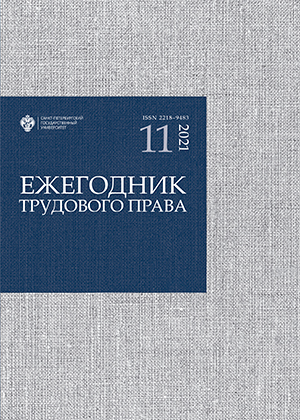Fundamentals of the formation of the function of social solidarity and compromise of labor law in Russia
Abstract
During legislative reforms, due to changes in society and the economy, the importance of the main categories of the law and its branches increases. Analysis of the functions of law makes it possible to reveal the true picture of the legal system and its branches. Labor law, one of the main branches of the legal system, is also changing. This has led to attention to the functions of labor law, including the function of social solidarity and compromise. The purpose of this function is to meet the socially significant needs of employees and employers representatives. Today, their role in the legal regulation of labor is significantly increasing. A retrospective analysis of the formation of this function was made taking into account the theory of needs. The paper concludes that the function of social solidarity and compromise began to form after the main functions of labor law: of guarantee and security, of administration (management), of social peace, after the abolition of serfdom and the emergence of a free labor force in Russia. The legal acts and literature analysis allowed to conclude that this process did not receive a logical end either before the 1917 revolution, or after it. It is impossible to talk about the final formation of this function in the pre-revolutionary period, since workers and employers did not understand the need for solidarity to protect their interests, as well as the essence of compromise as the best basis for the development of the relationship between labor and capital. After the revolution of 1917, this process did not receive an end, since the Soviet government from the first days and throughout the entire period of the USSR existence endowed the trade unions with unusual powers. The issues on which the trade unions had the right to make decisions did not correspond to their socially significant needs, the satisfaction of which is aimed at the implementation of the function of social solidarity and compromise, which led then to the manifestation of dysfunction. Exploring the dynamics of the development of labor legislation, the author comes to the conclusion that it is possible to speak about the full formation of this function only from the end of the 20th century. The impulse for this was not only the transition to a market economy, but also the removal from the competence of trade unions to resolve issues that are not inherent in their nature. This was reflected in the adoption of a number of laws that meet the socially significant needs of workers and employers acting through their representatives.
Keywords:
function of labor law, function of social solidarity and compromise, employee representatives, trade union, employer representatives, social partnership
Downloads
References
References
Downloads
Published
How to Cite
Issue
Section
License
Articles of "Russian Journal of Labour & Law" are open access distributed under the terms of the License Agreement with Saint Petersburg State University, which permits to the authors unrestricted distribution and self-archiving free of charge.




